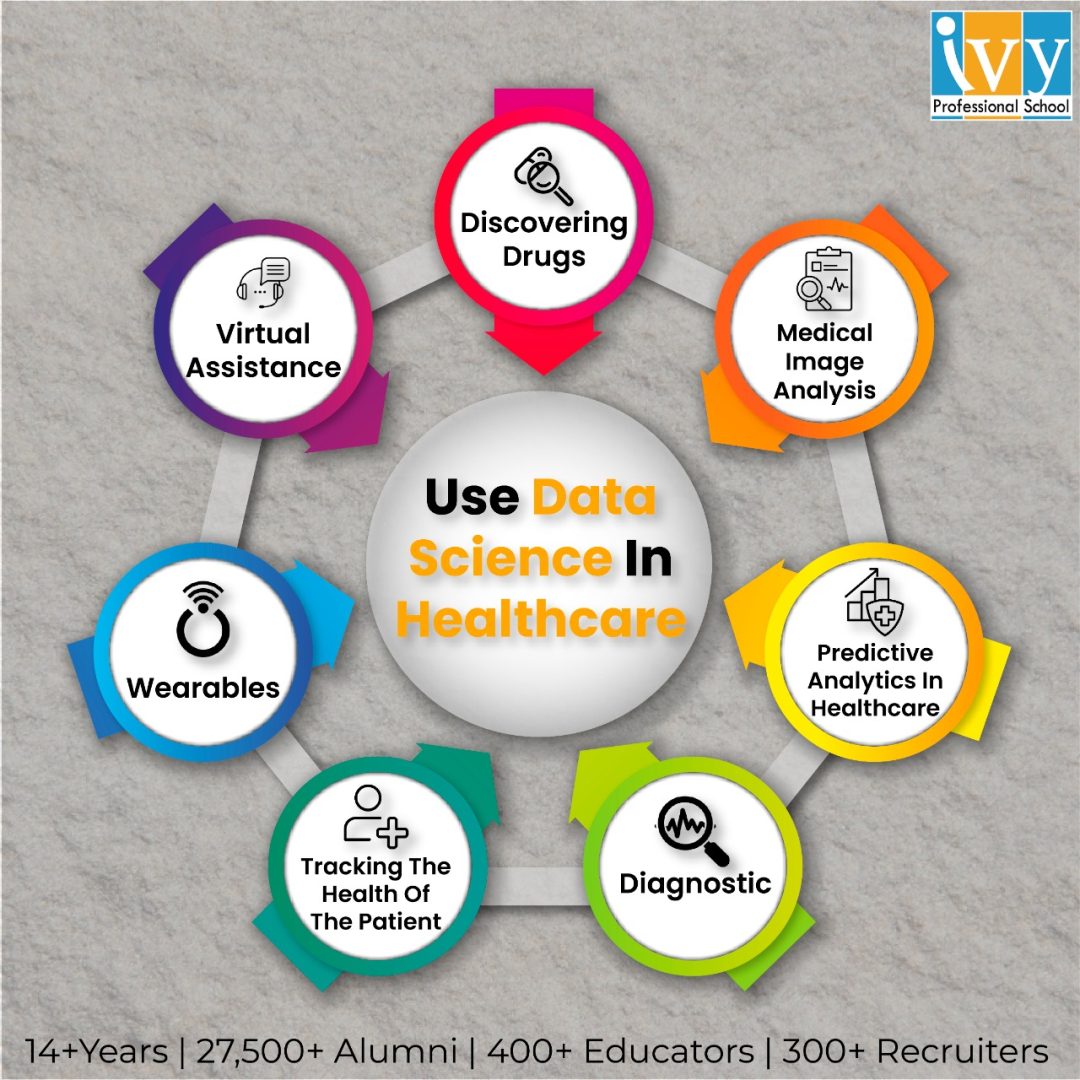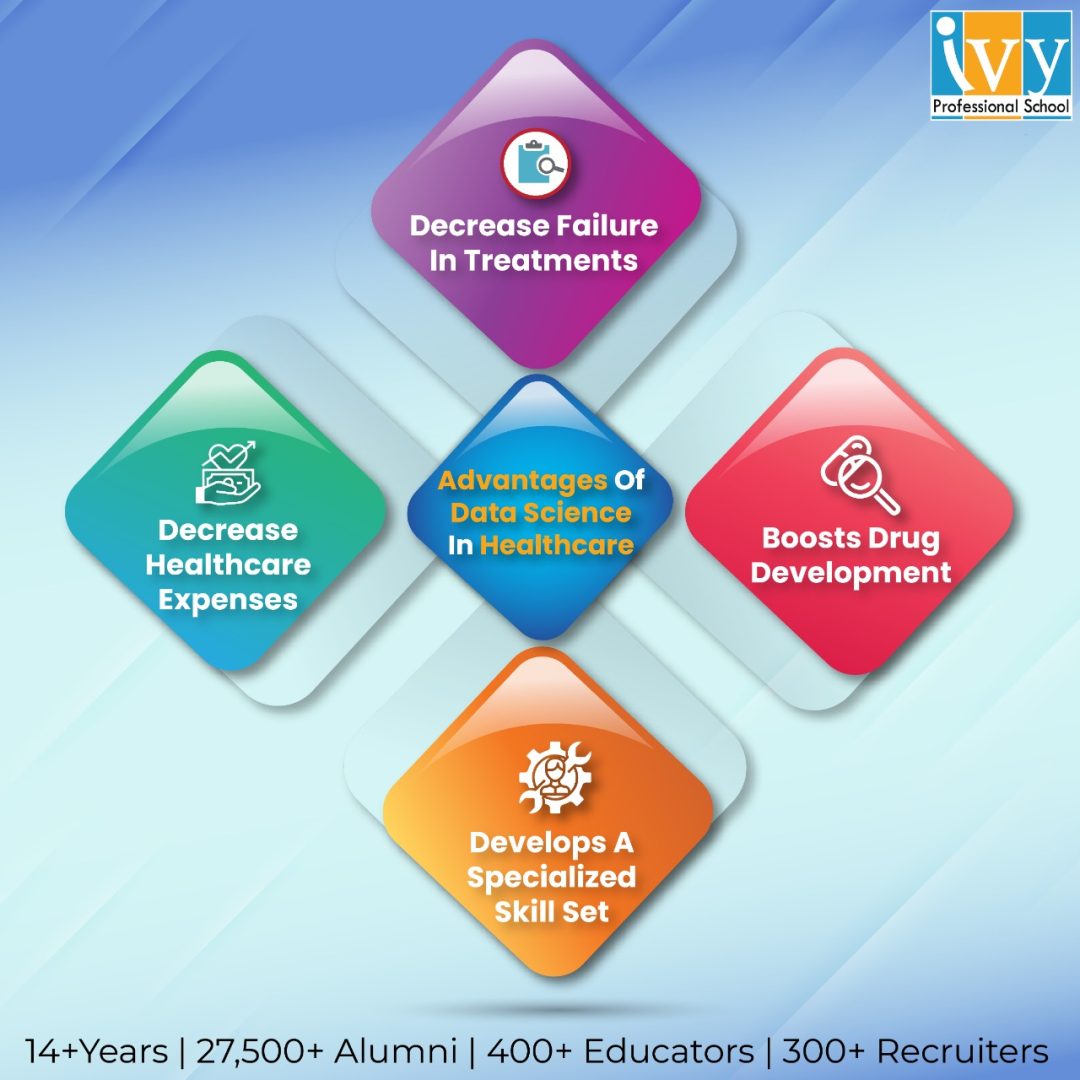Team Dec 15, 2022 No Comments
The varied use of big data in all sectors of our life from transportation to commerce makes us realize how crucial it is in our daily lives. In the same way, data science is transforming the healthcare sector. In this article, we are going to have a look at how data science in healthcare can bring about a big and distinctive change.
Nearly 3.5 billion US dollars have been invested in digital health startups and in healthcare data science projects in 2017 enabling companies to meet their ambition of revolutionizing the general notion of healthcare that the world carries. If you are aiming to pursue a career in data science in the healthcare domain, then this is the ideal article for you as you will find many data science in healthcare jobs.
There are numerous factors that make data science crucial in healthcare in the present time, the most crucial of them being the competitive demand for important data in the healthcare niche. The collection of data from the patient via effective channels can help offer enhanced quality healthcare to users. From health insurance providers to doctors, all of them depend on the collection of factual data and its exact analysis to make effective decisions about the health situations of the patients.

Nowadays, diseases can be anticipated at the earliest stage with the help of data science in healthcare, that too remotely with innovative appliances boosted by ML (Machine Learning). Smart devices and mobile applications constantly assemble data about blood pressure, heartbeat rates, sugar, and so on transferring this data to the doctors as real-time updates, who can structurize treatments accordingly.
The significant contribution of data science in the pharmaceutical industry is to offer the groundwork for drug synthesis using AI. The metadata of the patient and mutation profiling is used for developing compounds that point towards the statistical correlation between the attributes.
Presently, AI platforms and chatboxes are structured by data scientists to allow people to get a better evaluation of their health by putting in several health data about themselves and getting a precise diagnosis. Along with that, these channels also assist users with health insurance policies and guide them to a better lifestyle.
The present-day scenario of the IoT (Internet of Things), which assures optimum connectivity is a blessing of data science. Presently, when this technology is applied to the medical arena, it can help supervise patient health. Presently, physical fitness supervises and smartwatches are used by people to manage and track their health. Along with that, these wearable sensor devices can be monitored by a doctor if they are given access and in chronicle cases, the doctor can remotely offer solutions to the patients.
Data scientists have developed wearable devices for public health that will allow doctors to collect most of the data such as sleep patterns, heart rates, stress levels, blood glucose, and even brain activity. With the help of various data science tools and also machine learning algorithms, doctors can track and detect common scenarios such as respiratory or cardiac diseases.
Data science technology can also anticipate the slightest alterations in the health indicators of the patients and anticipate possible disorders. Several wearables and also home devices as a part of an IoT network employ real-time analytics to anticipate if a patient will encounter any issue based on their current scenario.
A crucial part of medical services, diagnosis can be made more convenient and quicker by data science applications in the healthcare domain. Not only does the data analysis of the patient boosts early detection of health problems, but medical heatmaps pertaining to demographic patterns of issues can also be made.
A predictive analytics model uses historical data, evaluates patterns from the data, and offers precise predictions. The data could imply anything from the blood pressure and body temperature of the patient to the sugar level.
Predictive models in data analytics associate and correlates each data point to symptoms, diseases, and habits. This allows the identification of the stage of the disease, the extent of damage, and the appropriate treatment measure. Predictive analytics in the healthcare domain also helps:
Healthcare professionals seldom use several imaging technologies such as MRI, X-Ray, and CT Scan to visualize the internal system and organs of your body. Image recognition & deep learning technologies in health Data Science enable the detection of minute deformities in these scanned pictures, allowing doctors to plan an impactful treatment strategy.
Along with that, health data scientists are continuously working on the development of more advanced technologies to improve image analysis. For instance, the latest publication in Towards Data Science, the Azure Machine Learning channel can be used in training and optimizing a structure to detect the presence of three common brain tumors, Meningioma tumors, Glioma tumors, and Pituitary tumors.
As a data scientist in the healthcare and pharmaceutical industry, you will have to use your analytical skills to diagnose illness precisely and save lives. The huge amount of data that is sourced from the healthcare niche, from patient data to records kept by government authorities need a skilled analyst to handle it all.
The Covid-19 pandemic has lately shown how important data science in healthcare can be. Not only has data science enhanced the sampling and collection of data but also demonstrated global patterns in the spread of the infection, anticipating the next region where Covid would spread and how government policies can be structured to fight against the contagious disease effectively.
Regarding national-level healthcare, data scientists can help in monitoring the spread of the disease within the nation and coordinate in accordance with the authorities to send resources to the most affected areas.
In this section, we will outline the important responsibilities of a healthcare data scientist:
Evaluating the role of data science in healthcare is also an important responsibility for a data scientist in the healthcare domain. It includes modifying assembled data to align with the objectives and aims of the company.
Here are some of the top advantages of data science in healthcare that you can think of:

Perhaps the most crucial utilization of data science in healthcare is to decrease errors in the process of treatment via accurate anticipations and prescriptions. Since a substantial portion of data about the medical history of the patient is collected by the data scientists, that stored data can be employed for identifying symptoms of illness and offering a precise diagnosis. Mortality rates have significantly decreased since treatment options may now be tailored and care is given with better knowledge.
The development of medicine needs intensive research and time. However, both effort and time can be decreased by medical data science. Via the usage of case study reports, lab testing results, and previous medical and the impact of the drugs in clinical trials, machine learning algorithms can anticipate whether the drug is going to offer the desired impact on the human body.
In the case of quality treatment that needs to be taken care of, it is essential to create skill sets that can offer a precise diagnosis. Using predictive analytics, one can anticipate which patients are at greater risk and how to get in early to prevent serious damage. Along with that, the huge quantity of data requires to be managed skillfully to stop errors in administration, for which data science can be an ideal solution.
EHRs (Electronic Health Records) can be used by data science specialists in the medical arena to identify the health patterns of patients and stop unnecessary hospitalization or treatments, thus decreasing costs.
The 21st century is making lucrative use of data science in the healthcare niche to boost surgeries, operations, and patient recovery procedures. Apart from the developments in technology and the raised digitization of lifestyles, data science will also help in decreasing healthcare expenses, making quality medical amenities accessible to everyone.
We can conclude that there are various applications of data science in healthcare. The pharmaceutical and healthcare industry has heavily used data science for enhancing the lifestyles of patients and anticipating diseases at an early stage.
Along with that, with the advancements in medical image analysis, it is possible for doctors to find microscopic tumors that were previously difficult to find. Hence, it can be concluded that data science has revolutionized the healthcare sector and also the medical e
Now come to the section, where we can talk about how you can take your data science career to the next level. To establish your career in data science in the healthcare section you will have to have some sort of certification. The best institute for Data Science in this country is Ivy Professional School. Ivy offers a range of certifications that will help you in the future.
Leave a Reply